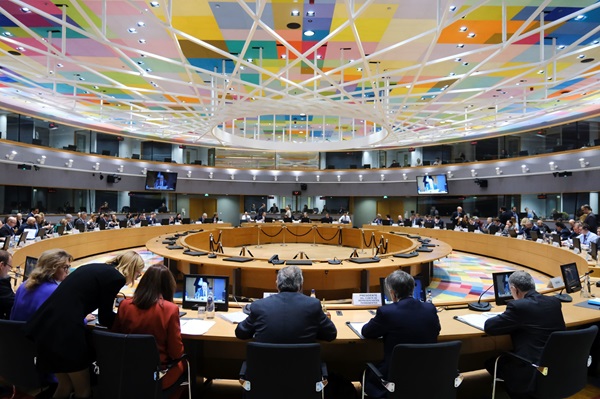 Credit: European Union Council
Credit: European Union Council
On Thursday 7 December 2023, Luxembourg’s Minister of Economy, Small and Medium-Sized Enterprises (SME), Energy and Tourism, Lex Delles, participated in the meeting of the Competitiveness Council which took place in Brussels under the Spanish Presidency.
Ministers from the 27 Member States of the European Union discussed concrete actions to increase the resilience of European industry and SMEs on the path towards sustainability and climate neutrality of the European economy by 2050.
The current poly-crisis context has confirmed the need for a reduction in dependencies on third countries in supply chains and a strengthening of the EU's strategic autonomy. In this context, a series of legislative initiatives, essential to achieve the objectives of the green transition and to maintain the competitiveness of European industry, are currently under discussion.
Thus, the work of the “Competitiveness” Council of 7 December focused on two concrete actions proposed by the European Commission.
The Net-Zero Industry Act to strengthen European production of net-zero technologies
Ministers agreed on their position on the Net-Zero Industry Act, which aims to create a European framework to ensure the production of and access to net-zero technologies needed to decarbonise the European economy by 2050. These include technologies such as photovoltaic panels, heat pumps and alternative sustainable fuels. Minister Delles was particularly pleased with the inclusion of sustainable alternative fuels as a strategic technology, particularly important for the competitiveness of the aviation sector. On the other hand, the minister expressed regret that nuclear technologies are considered strategic for the European Union while specifying that “we must respect the energy mix of each Member State”. The minister also indicated that he fully supports the objectives and ambition of this initiative which will accelerate site authorisation procedures for clean technologies, with a view to administrative simplification, also for SMEs.
The participation of SMEs in the net-zero economy
The ministers also exchanged views and experiences concerning measures to better involve SMEs in the green transition. Minister Delles emphasised the essential role of SMEs in the transformation of the economy and the need to provide tailor-made financial and administrative support to continue to support them in the face of inflation and high energy prices. He said: “SMEs are essential in the production and delivery of net-zero solutions. They thus have a fundamental role for the green transition of various sectors, including in particular that of construction, for which they provide not only sustainable materials, but also net-zero technologies such as heat pumps or photovoltaic panels.” He specified that initiatives such as the “Klimapakt fir Betriber” (the strategic orientation platform allowing consultation and coordinated implementation of projects and activities of different public and private actors) should be further promoted.
Ban products made from forced labour on the European market
The Competitiveness Council also held a debate on the new rules proposed by the European Commission which aim to prohibit the placing on the Union market of products resulting from forced labour, whether manufactured in the European Union or imported from third countries. “We must establish a level playing field for all businesses by protecting them against unfair competition caused by those who resort to despicable practices, such as forced labour and forced child labour,” stressed Minister Delles. The minister also emphasised his attachment to a risk-based approach: “We must target problematic situations and avoid placing all companies and the products they offer under general suspicion due to the reprehensible and reprehensible behaviour of a minority between them." Concerning the implementation of the future instrument, the minister pleaded for an essential and preponderant role for the European Commission in matters of investigation and decision: “We must guarantee the effectiveness and uniform implementation of the instrument throughout the Union.”









